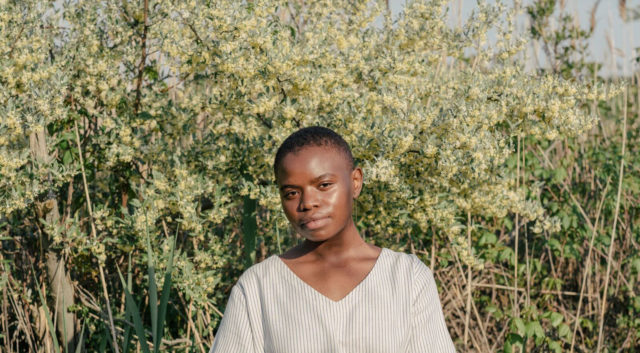
“I’m talking to you like you’re my therapist,” Laeticia Tamko says toward the end of our sprawling phone conversation. She’s open, yes, but it’s less like psychotherapy and more like two good friends talking in the wee hours, laughing at the high jinks of a night out on the town before the conversation inevitably (as it does with good friends) attempts to unravel the mysteries of the mortal coil only to find more knots in the thread. It’s a conversation that is vulnerable and comfortable and loving.
Truth is, there’s little doubt Tamko makes everyone feel this way, without artifice.
Her sincere kindness and accessibility lends itself to a gentle type of determination, a drive that pushes Tamko to be the best without the conceit, indifference and bitterness that are sometimes served alongside brilliance and resolve.
At 13 she moved from her native Cameroon to Harlem so her mother could attend law school. Fluent in English and French, Tamko also came stateside rocking a buzz cut that, while common among women in Cameroon, garnered some strange looks from American high schoolers. The family soon moved to Brooklyn, where Tamko graduated high school at 17 (she skipped the fifth grade). During her senior year she received her first guitar — an event you’d want to write in all caps, highlight and underline on a time line of her life — and she set about teaching herself with an instructional DVD. Without missing a beat, after graduation she headed to City College of New York to double major in engineering and computer code, a choice based on her aptitude for math and the fact that she comes from an “academic” family (and because her parents didn’t see “musician” as a stable career choice). Characteristically indomitable through the demands of engineering school, Tamko kept on playing her guitar and writing songs that never made their way even onto a sheet of paper until a friend convinced her to get a few of them out of her head and onto Bandcamp.
Then the fire began to spread.
By her final year of college, Tamko was finishing classes, working a full-time engineering job and laying down her first full-length LP under the moniker Vagabon, an alias chosen to avoid constant mispronunciation of her name (it’s lah-tee-cee-uh).
“It does feel like I’ve already lived three lives,” the 24-year-old says after we plow through the string of events that brought her to this moment, to these interviews with Pitchfork and Spin and W Magazine, to the cover of the New York Times Arts & Leisure section, to her first headlining tour through Europe and North America.
It was only this past March that Tamko quit her engineering job to pursue music full-time. It’s all happened quickly, but Tamko has always been at the helm, steering the ship in the direction she wants at the pace she wants.
With eight tracks clocking in at just under 30 minutes, Infinite Worlds is a microcosm of Tamko’s life, a portrait of unflinching vulnerability delivered via fuzzed-out guitars and wistful synths as the backdrop for her charming and powerful tenor. Always eager to learn and quick to excel, Tamko took the time to learn and lay down the tracks for each instrument on the record. The process took nine months.
“I am a new artist. I wanted to be sure that I can have my name — a female name — written all over the credits,” Tamko says.
The album sweetly and thoughtfully examines growing pains and love lost and being awkward, but it also speaks to marginalization, something that Tamko, as a black woman who entered into the white-washed worlds of STEM and indie rock, really understands. Infinite Worlds is, by Tamko’s admission and by the standards of most art, documenting her process as both an artist and a young black woman.
“It’s very convoluted and it’s very tricky, and I think that my identity is something that I’ve started to protect because I don’t think I thought about how it can be used until it started being used,” she says.
“I can never shy away form my blackness. There is no ambiguity here. There’s nothing that, even if I was never as proud as I am and even if I didn’t feel as beautiful or worthy or special as I do, there’s no way that I can operate without [that identity]. Even if I choose not to, other people will.
“I believe everything is inherently political.”
Even so, the goal now is to figure out how much of her personality to share and how much to keep for herself, how to champion for people of color without boxing herself in.
“I don’t want to be a bookmark for some sort of movement,” she says. “What is changing and what needs to be nurtured is the artistry of people of color so that we don’t turn artists into activists but that they can be artists and activists if they chose to. I don’t want to be pushed into that because there are people who do [activism] very seriously and I can’t hang.”
She laughs, but there’s little doubt that Tamko can hang. She’ll just do it on her terms.














